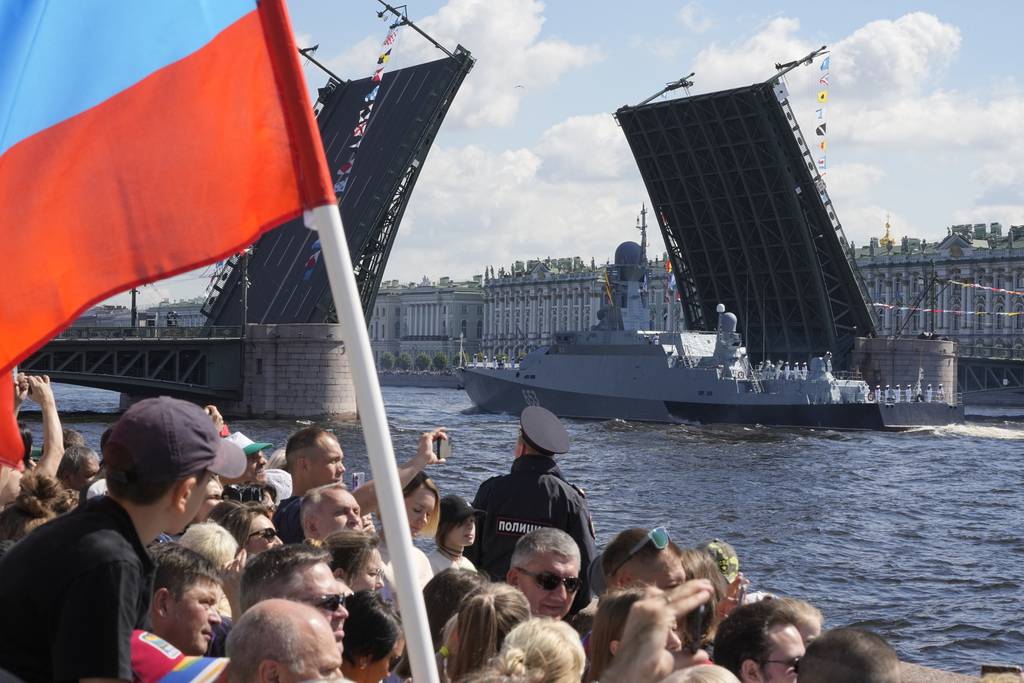
MOSCOW — The Russian Navy will receive about 50 ships of various classes this year, compared to 32 last year, according to the deputy minister of industry and trade.
The announcement comes amid the country’s invasion of Ukraine, during which Ukrainian forces have destroyed and disabled several Russian naval vessels.
Viktor Yevtukhov unveiled the forecast June 9 during an interview with the state-owned channel Zvezda TV. In total, according to the Ministry of Industry and Trade, the Navy took delivery of 40 surface ships and 24 submarines over the last decade.
In 2023, the Navy received three submarines: the Borei-A-class nuclear-powered Emperor Alexander III; the Yasen-class nuclear-powered Krasnoyarsk; and the Kilo-class Mozhaysk.
The service also took on seven surface ships: the frigate Admiral Golovko; the corvettes Merkury and Rezkiy; the missile-armed ships Cyclone and Naro-Fominsk; the minesweeper Lev Chernavin; and the repaired frigate Neustrashimy.
This year, the Navy is expected to receive four submarines and 12 surface ships, plus a collection of support vessels such as tug boats; bulk carriers; training, hydrographic, rescue and supply vessels; and other small boats, according to Pavel Luzin, a Russia defense expert with the Washington-based Center for European Policy Analysis think tank.
Yevtukhov attributed the large anticipated delivery to Russia’s successful efforts in finding substitutions for components blocked by international sanctions.
Sergey Smyslov, an independent analyst with an engineering background in Russia’s defense sector, said domestic organizations have begun producing the substitutions.
“Yes, it may not be of the best quality, and additional time is required to develop the missing components, but the minimum necessary requirements are [being met],” Smyslov added.
However, the outdated or low-quality technology used as a result impacts the reliability of the final product, Luzin said.
Nevertheless, a source in Russia’s naval industry told Defense News that the Defence Ministry is generally satisfied with submarine construction efforts. Still, the source added, shortcomings remain in regard to the production of surface ships, with delivery dates regularly postponed.
Indeed, Emma Rayman, a politician from St. Petersburg, said “the problems of the Navy are related to the fact that the naval industry requires significant financial investments, and budget constraints can affect the speed and scale of construction of new ships.”
For example, the Severnaya Verf shipyard was supposed to transfer the frigate Admiral Isakov to the Navy in 2022, but that is now scheduled to take place in December 2025.
Likewise, service was to receive the corvette Provorny by the end of 2022, but due to damage from a fire, the deadline was pushed to 2025. Additionally, two Steregushchiy-class corvettes were to be delivered in 2018; thus far, one was transferred in 2023.
The Admiralty Shipyards plant was also supposed to transfer a patrol ship to the Navy in 2020, but that is now expected to take place this year.
As for the Yantar Shipyard, it was expected to deliver a pair of large landing ships — the Vladimir Andreev and Vasily Trushin — around the 2023-2024 time frame. But even before this deadline passed, it was changed to 2025-2026.
The Vostochnaya shipyard has also experienced setbacks in the construction of Navy ships. In particular, the firm was to build two Karakurt-class corvettes and a small tanker, but amid financial troubles, the Amur Shipbuilding Plant, owned by United Shipbuilding Corp., took charge in August 2023.
A shortage of engineers and specialists in the domestic shipbuilding industry is also slowing down construction efforts, Rayman said, with Luzin noting there aren’t even enough personnel to crew the ships.
Maxim Starchak is a Russia correspondent for Defense News. He previously worked as an editor for the Russian Defence Ministry and as an expert for the NATO Information Office in Moscow. He has covered Russian nuclear and defense issues for the Atlantic Council, the Center for European Policy Analysis, the Royal United Services Institute and more.
- SEO Powered Content & PR Distribution. Get Amplified Today.
- PlatoData.Network Vertical Generative Ai. Empower Yourself. Access Here.
- PlatoAiStream. Web3 Intelligence. Knowledge Amplified. Access Here.
- PlatoESG. Carbon, CleanTech, Energy, Environment, Solar, Waste Management. Access Here.
- PlatoHealth. Biotech and Clinical Trials Intelligence. Access Here.
- Source: https://www.defensenews.com/naval/2024/06/14/will-russias-navy-get-the-50-ships-it-expects-this-year/



